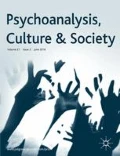Abstract
Popular film is an important and effective ideological apparatus and has the potential not only to reinforce subjectivity but also to expose the workings of ideology. Within a psychoanalytic framework, this paper examines the recent historical/fantasy film 300 to assess the demands of ideology on the subject, the political consequences of the form of subjectivity that is affirmed, and the potential of this film to rationalize attitudes that provide justification for present conflict such as the War on Terror. Through this analysis, the article explores the reproduction of subjectivity and, significantly, how it can be challenged.
Similar content being viewed by others
Notes
The Real is defined by Jacques Lacan as that which ‘resists symbolization absolutely’ (Lacan, 1988, p 66). It acts as the barrier between the signified and the signifier and thus constitutes the impossibility of fixed meaning, identity or social totality. It is the essence of a thing, unmediated by the symbolic order and thus impossible to define or comprehend, but nonetheless present and crucial. Although ideology attempts to disguise the existence of the Real, it tends to reveal itself through social contradictions and antagonisms. Therefore, managing, disguising and subverting the Real are essential elements of a functioning ideology.
For further papers on this subject and the historical inaccuracies of 300, see Daryaee (2007), Leupp (2007) and Golsorkhi (2007).
The term ‘hidden content’ used here is analogous to Freud's latent dream thought in his work on dreams.
This refers to identification with the image in which we appear likable to ourselves.
For a selection of comments supporting this argument, see the 300 website on myspace.
References
Althusser, L. (1999) Ideology and ideological state apparatuses (Notes towards an investigation). In: S. Žižek (ed.) Mapping Ideology. London: Verso, pp. 141–151.
Bush, G. (2005) President addresses joint armed forces officers’ wives’ luncheon, http://www.whitehouse.gov/news/releases/2005/10/20051025.html, accessed 4 August 2007.
Daryaee, T. (2007) Go tell the Spartans: How ‘300’ misrepresents Persians in history, www.iranian.com/Daryaee/2007/March/300/index.html, accessed 7 June 2007.
Davis, W.A. (2003) Death's dream kingdom: The American psyche after 9-11. Journal for the Psychoanalysis of Culture and Society 8 (1): 127–132.
Eagleton, T. (1999) Ideology and its vicissitudes in Western Marxism. In: S. Žižek, (ed.) Mapping Ideology. London: Verso, pp. 179–226.
Freud, S. (1933, 1991) Revision of the theory of dreams. In: J. Strachey and A. Richards (eds.) New Introductory Lectures on Psychoanalysis. London: Penguin Books, pp. 35–59.
Golsorkhi, M. (2007) A racist gore-fest, www.guardian.co.uk/commentisfree/2007/mar/19/thereleaseofthebox, accessed 7 June 2007.
Homer, S. (2005) Jacques Lacan. London: Routledge.
Huntington, S. (1993) The clash of civilizations? Foreign Affairs 72 (3): 22–49.
Lacan, J. (1988) Discourse analysis and ego analysis. In: J.A. Miller, (ed.) The Seminar of Jacques Lacan. Book I: Freud's Papers on Technique, 1953–1954. London: Norton, pp. 62–72.
Laclau, E. (1990) New Reflections on the Revolution of Our Time. London: Verso.
Lasswell, H. (1927) The theory of political propaganda. American Political Science Review 21 (3): 627–632.
Leupp, G. (2007) A racist and insulting film: 300 vs. Iran (and Herodotus), www.counterpunch.org/leupp03312007.html, accessed 7 June 2007.
McGowan, T. (2003) Looking for the Gaze: Lacanian film theory and its vicissitudes. Cinema Journal 42 (3): 27–47.
Miller, J.A. (1992) Ethics in psychoanalysis. Lacanian Ink 5 (Winter): 26.
Mission of the Islamic Republic of Iran. (2007) Movie 300 is full of deliberate distortions. Islamic Republic News Agency, http://www2.irna.ir/en/news/view/line-17/0703226121084659.htm, accessed 9 June 2007.
Morgan, L. (2007) 300 – The battle for the film, comics2film.com, 16 February, http://www.comics2film.com/index.php?a=story&b=24644, accessed 7 June 2007.
Mutman, M. (1992) Under the orientalist sign: The West vs. Islam. Cultural Critique 23: 165–197.
Salaita, S.G. (2006) Beyond orientalism and Islamophobia: 9-11, anti-Arab racism, and the mythos of national pride. New Centennial Review 6 (2): 245–266.
Shaheen, J.G. (2003) Reel bad Arabs: How Hollywood vilifies a people. Annals of the American Academy of Political and Social Science 58: 171–193.
Žižek, S. (1982) Hidden prohibitions and the pleasure principle: An interview with Slavoj Žižek, http://www.lacan.com/perfume/Zizek, accessed 14 June 2007.
Žižek, S. (1991) Grimaces of the real, or when the phallus appears. October 58: 44–68.
Žižek, S. (2002) The Sublime Object of Ideology. London: Verso.
Author information
Authors and Affiliations
Corresponding author
Rights and permissions
About this article
Cite this article
Scriver, S. Subjectivity, identity and 300 Spartans. Psychoanal Cult Soc 14, 183–199 (2009). https://doi.org/10.1057/pcs.2008.35
Published:
Issue Date:
DOI: https://doi.org/10.1057/pcs.2008.35




